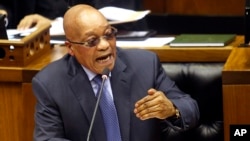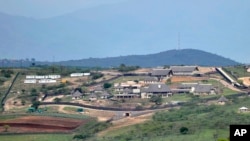South Africa’s President Jacob Zuma is expected to pay half a million dollars to the treasury following a Constitutional Court ruling that said he should pay part of the $16 million of public funds used to renovate his private home in Nkandla.
The court also asked the country’s national treasury to determine how much Zuma has to pay for the upgrade to his private home. The president has 45 days to pay the $500,000 as determined by the treasury.
Parliamentarian Jordan Lewis from the main opposition, the Democratic Alliance, is pleased with the decision.
“We welcome the fact that the president has to pay something at all. It’s a vindication of our argument over many years that the president benefited unduly and corruptly from the upgrade to his private home at Nkandla, and that he should pay back a portion of what was spent there,” said Lewis.
“We must not forget that $16 million of taxpayers' money was used to upgrade his home of which he has been ordered to repay just $500,000. So, while it is good that he is paying something, we can’t forget that his benefit in this scandal was massive and much larger than what he is paying. It does not absolve him of the obvious corruption and illegal activity…. And we still feel he has a great deal to answer for, including possibly criminal charges,” he said.
In 2014, South Africa’s public prosecutor, Thuli Madonsela, ruled that Zuma benefited from the security upgrade of his house, which cost the public $23 million. She directed that Zuma pay back a reasonable amount of the cost, which Madonsela said in her report should be determined by the treasury with assistance from the police.
Accountability at issue
The changes made to Zuma’s rural home included a visitor’s center, swimming pool, helipad and cattle enclosure. In a letter, Zuma proposed to refund some of the public funds.
Local media quoted a statement from his office as saying, “To achieve an end to the drawn-out dispute in a manner that meets the public protector’s recommendations and is beyond political reproach, the president proposes that the determination of the amount he is to pay should be independently and impartially determined… Given the objection by one of the parties to the involvement of SAPS [South African Police Service], as the public protector herself had required, the auditor general and minister of finance be requested by the court, through appropriate designees, to conduct the exercise directed by the public protector.”
Supporters say the controversy should end since Zuma has signaled his willingness to pay for the upgrades. Some opponents had called for the president to also pay interest on the public funds that were used.
Parliamentarian Lewis says the president has to be held accountable, adding the opposition party will closely monitor the president to ensure he pays the $500,000 from his own pocket as ordered by the court.
“The treasury calculation was related to only five items of non-security upgrades. But there were many other items that were not included in the treasury calculation - things like air-conditioning throughout his home; things like the construction of 27 additional homes on the property that were supposedly to be used by security personnel but the benefit of which includes the president’s private family," he said. "So there were many items that were not included in the treasury calculation and which we believe the president is also liable for.”
“We will be watching very closely to see how he pays it in full. It is not acceptable for him to raise money from donors. The court specifically said he must pay personally. Then, in addition to that, we have got the criminal charges against him for the corruption in the Nkandla matter. And, we still believe that the state must pursue those charges in order to recover as much money as possible for the public,” Lewis added.





